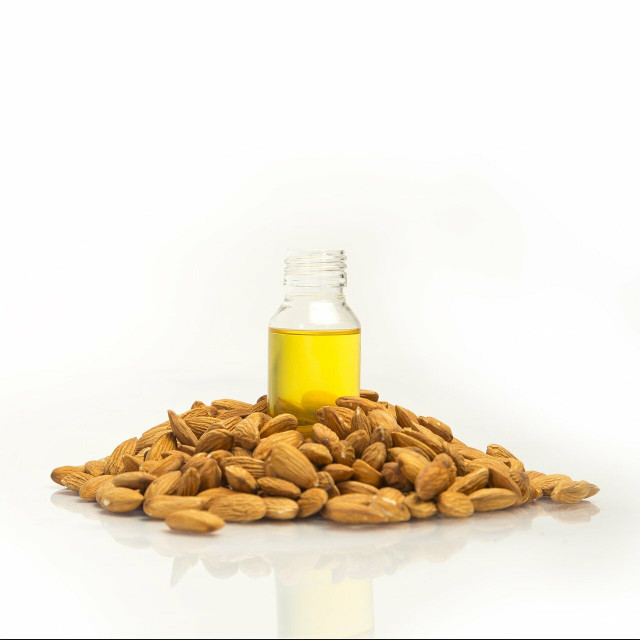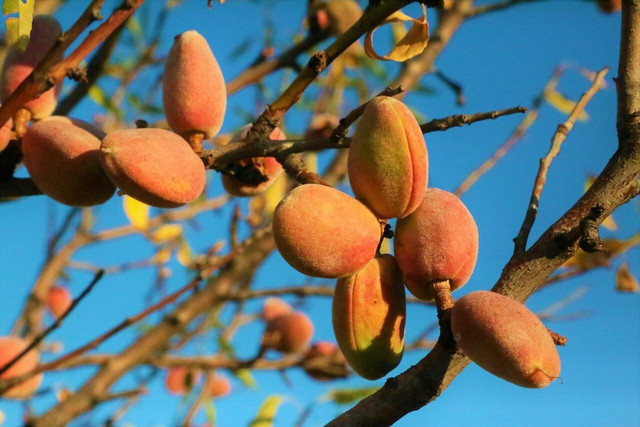Almond oil is a popular ingredient in many beauty products and some recipes. There are many benefits of almond oil, but you should watch out for a few things when purchasing it yourself.
Almond oil is a plant oil that is extracted from almonds. Contrary to popular belief, almonds are actually not true ‘nuts’, but rather ‘drupes’. That means that the familiar almond ‘nut’ is a seed that grows inside a fuzzy outer fruit.
There are multiple varieties of almonds, but the one that almond oil is usually extracted from is the sweet almond. Some of the benefits of sweet almond oil include the ability to moisturize the skin and hair and provide a source of healthy fats in our diets. It’s even said to improve mental wellbeing. However, different methods of extracting the oil result in different nutritional products, which can affect the benefits the oil has on both beauty and health.
The Nutritional Content of Almond Oil

According to the U.S. Department of Agriculture’s FoodData Central, almond oil has the following nutritional properties per 100 grams:
- 884 Calories
- 100g Total fat
- 8.2g Saturated fat
- 69.9g Monounsaturated fat
- 17.4g Polyunsaturated fat
- 39.2mg Vitamin E
- 7μg Vitamin K
- 0.4mg Choline
Its high Vitamin E content in particular results in many of the benefits of almond oil:
- Vitamin E is an antioxidant, meaning it can prevent the body from a physiological imbalance called oxidative stress — this condition may be an underlying factor for many disorders including cardiovascular disease, cancer, and even aging.
- Vitamin E is also anti-inflammatory, and may have many health benefits such as reducing the symptoms of joint disease.
Its high concentration of unsaturated versus saturated fats also makes it a healthy oil. Unsaturated fats can lower cholesterol levels and therefore help to prevent heart disease.
Although there are many benefits of almond oil, it is unfortunately made from almonds, which are the FDA classifies as ‘tree nuts’, or one of the major food allergens.
Almond Oil for Your Skin & Hair



There are several uses and benefits of almond oil for the skin and hair.
- It can be used as a facial moisturizer and cleanser. Although putting oil on your skin in order to cleanse may sound counterintuitive, oil cleansing may be useful for removing other oily or water-resistant substances such as waterproof sunscreen. Oil cleansing is also said to protect the skin barrier and improve moisture levels.
- It can soften and may even strengthen the hair.
Despite these many benefits, almond oil may be dangerous when applied to the skin in excess. One study published by Oxford University Press found that Vitamin E applied to the skin could cause cancer in rodents. The researchers suggest that it may be beneficial to avoid prolonged application of Vitamin E to the skin.
Almond Oil for Aromatherapy



Another benefit of almond oil can be found in its usage in aromatherapy. Almond oil acts as a carrier oil in aromatherapy massages, meaning that it acts as a diluting base for a scented essential oil.
- Within its role in massage, almond oil can be absorbed into the skin quickly, delivering its benefits as fast as possible.
- It may also have benefits for both our mental and physical wellbeing. One study headed by researchers from Kyoto Prefectural University of Medicine found that aromatherapy massage using almond oil could reduce anxiety and boost the immune system.
If you are looking to destress and give your body a helpful pick-me-up, getting an aromatherapy massage with almond oil can be a great idea. Keep in mind, however, that while almond oil is generally safe for individuals who do not have tree nut allergies, the essential oils also used in aromatherapy can often cause allergic reactions. You should therefore make sure to test essential oils before usage.
How to Use Almond Oil for Cooking



In addition to all of these other benefits, you can also improve your health by incorporating almond oil into your diet. Almond-based foods including almond oil can have many positive effects.
- For example, one study published in the Journal of the American College of Nutrition found that consuming almonds could reduce insulin and improve the health of individuals with prediabetes. This suggests that they may aid blood sugar regulation.
- Although topical application of almond oil might be dangerous in high levels, consuming almond-based foods may reduce risks of cancer. According to a 2015 study, eating many nuts, including almonds, may protect against the development of breast cancer.
Oils that are extracted through an unrefined process are more nutritious than those extracted through a refined process. This means that in general, you should look out for unrefined almond oil to enjoy all its benefits. The one exception is if you intend to use your almond oil for very hot foods. The refining process makes refined almond oil more stable than unrefined almond oil, meaning that it is less likely to degrade at a higher temperature.
The Downsides of Using Almond Oil



Despite its many uses and benefits, almond oil has a significant environmental impact that makes it less appealing.
- Almonds have an extremely high water footprint, with just one kernel requiring about 2.6 gallons to produce.
- The process of extracting oil from the raw seeds requires additional resources that can have negative effects. For example, some extraction methods use the chemical hexane, which the EPA recognizes as causing neurological problems. Other methods such as aqueous extraction use additional water resources, adding to the already large water footprint of the almond crop.
According to a group of healthcare and environmental specialists, the most environmentally friendly almond oil extraction methods are ultrasonic-assisted extraction, supercritical fluid extraction, subcritical fluid extraction, and salt-assisted aqueous extraction. So if possible, select almond oil products that have utilized these extraction methods.
Additionally, you can lessen your contributions to these negative environmental effects by limiting your use of almond oil. For example, instead of using lots of almond oil to moisturize your hair, you can consider other homemade conditioners instead.
As you can see, almond oil has a wide variety of useful properties, but also a large environmental footprint. You should be careful not to use it excessively, and choose unrefined oils that were extracted using environmentally friendly methods wherever possible.
Read more:
- How to Toast Slivered Almonds: Step-by-Step
- How Do You Make Almond Milk? Easy Homemade Recipe
- Rose Water for Skin: Benefits and How to Use It
Do you like this post?









